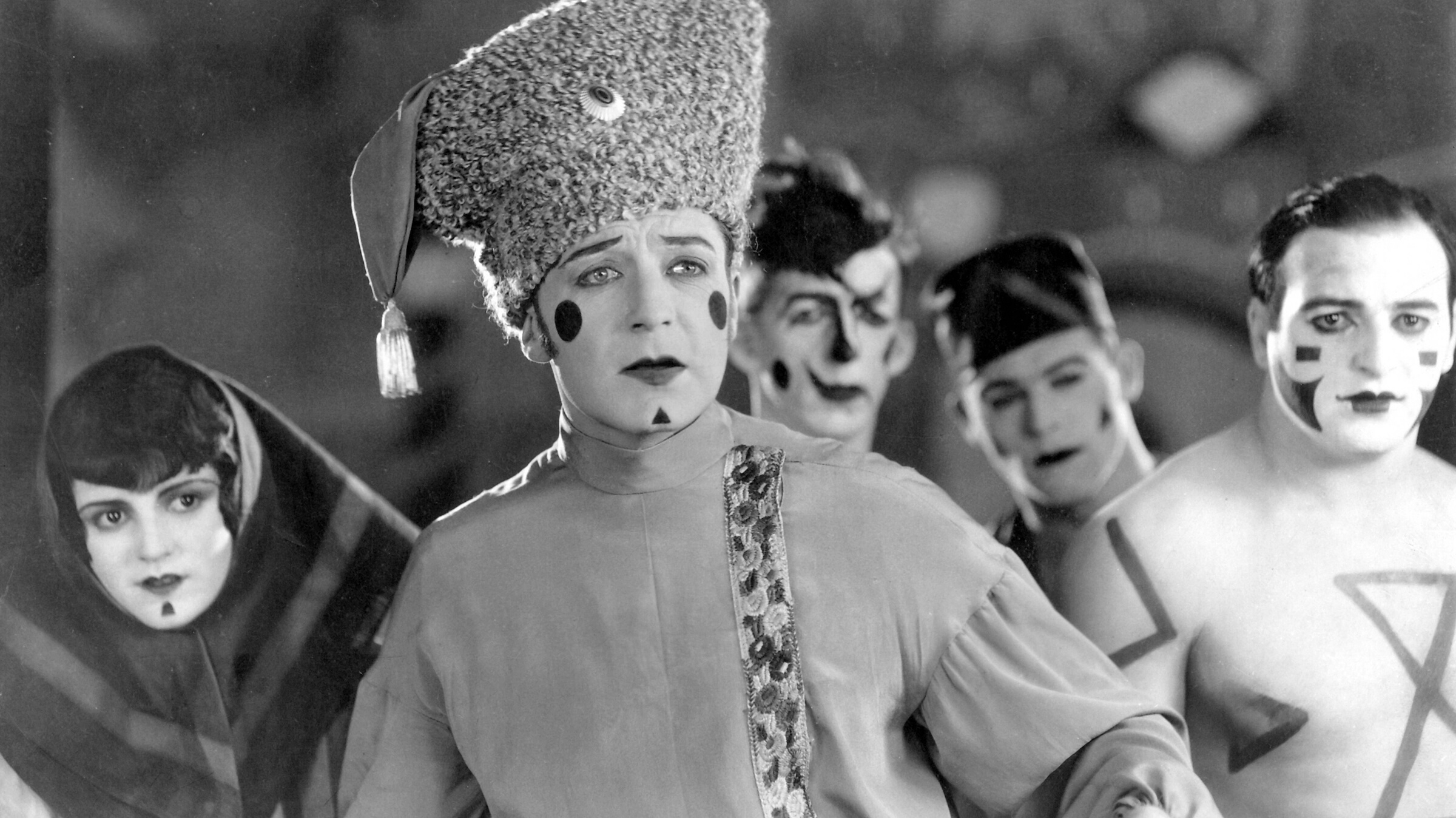You Never Know Women brings multiple gifts to lovers of silent film: the serene beauty of Florence Vidor (“the orchid lady of the screen”); two leading men, the handsome Clive Brook and the wryly sophisticated Lowell Sherman; character actors El Brendel and Eugene Pallette; performances from key vaudeville players of the 1920s; and highly cinematic direction by William A. Wellman.
The plot includes a love triangle, a Houdini-like underwater escape, a menaced virgin, a chase through a darkened theater, and a trained goose wearing a tiny top hat and glasses (it can roll over and play dead). There’s also a modern twist to remind us that the issues behind “#metoo” have been around in women’s lives—both on-screen and off—for a very long time. The original pressbook for the film describes it as “a love story of a lady with magic eyes,” starring Florence Vidor, prominently billed above the title.
Florence Vidor was the first wife of the famous director, King Vidor, whose name she took and kept professionally. Wed in Texas in 1915, the two decided as a young couple to make their fortune in Hollywood. By the mid-1920s, she was a star in both comedy and drama, he was a celebrated director, and they were divorced, having separated in 1923. (She wed the famous violinist, Jascha Heifetz in 1929 and left movies.) Vidor is probably best known today for her role in Ernst Lubitsch’s 1924 masterpiece, The Marriage Circle. Lubitsch loved her, calling her “the essence of refinement,” but lest that should make her sound dull added that she was a “brunette with a blonde soul.” She’s soft and feminine, with thick hair, alabaster skin, clear eyes, a calm and ladylike exterior, but also with a real 20th century kick in her electric presence.
Vidor plays “Vera Janova,” a headliner in “The Imperial Vaudeville of Russia.” She’s a fascinating character because she’s both an old-fashioned fair maiden and a modern flapper. She’s romantic, reads poetry, and dreams of a heroic Cinderella-style love. She also flies through the air on wires, has knives and spears thrown at her, and bravely balances on a narrow board held in the air by the wobbling feet of an acrobat. She’s touring the United States (with no family member alongside her) and has a successful career with equal billing to her male partner.
Vidor is well-supported by two strong actors: Clive Brook and Lowell Sherman. Born in England, Brook exemplifies a reserved and ramrod-straight British matinee idol. Since he’s playing a Russian magician, he’s thus a bit of a British Russian magician, but he’s still totally credible. He politely keeps out of the romantic life of the woman he loves, just doing his job throwing knives at her, until she needs him. His rival is played by Lowell Sherman, a born-in-a-trunk child of several generations of actors who was successful both as performer and director. (He guided Katharine Hepburn to her first Oscar in Morning Glory and helped make Mae West a star in She Done Him Wrong.) In You Never Know Women, he’s a self-confident lecher who acts as if ruining young women was his personal privilege. When Vidor rejects him, he turns ugly, but once vanquished, resumes his smoothly mannered falsity. Donning his top hat, he bows, says “Good Night,” and exits gracefully out the door.
El Brendel and Eugene Pallette were actors mainly defined by the sound era: Brendel with his Swedish impersonations and Pallette with his uniquely gravelly voice. The hefty Pallette will be instantly recognizable to fans of screwball comedy and classics like The Adventures of Robin Hood, even though, in 1926, he looks young and almost (not quite) slim. He’s unbilled as a guest at a ritzy dinner party for which Sherman has hired Vidor’s troupe to entertain. Pallette looks over the young women and callously asks Sherman to “pick out a little brunette for me—one that speaks English.” El Brendel is a comic who sympathetically observes the latent love between Vidor and Brook. (He tells a fellow trouper, “You never know women, Dmitri.”) An experienced vaudevillian working his first year in Hollywood movies, Brendel later became “America’s Swede-heart,” a character with a thick accent, limited intelligence, and plenty of “yumpin’ yiminy” exclamations that today would land him in the office of the Swedish Defamation League!
The backstage story of You Never Know Women is, of course, not original. Over it inevitably hangs E.A. Dupont’s 1925 German expressionistic story of theater life, Variety, starring Emil Jannings and Lya de Putti. But You Never Know Women, with a screenplay by Benjamin Glazer and Ernest Vajda, is deeply rooted in scenes of the “family” life of vaudeville performers as they banter backstage and live together in friendship. Their onstage routines invoke the reality of an actual vaudeville house in 1926. The bizarre creativity of these acrobats, dancers, jugglers, aerialists, and tumblers, not to mention the famous (in his day) “Frog Man Contortionist,” is delightful history.
You Never Know Women confirms William Wellman as an early visual stylist. Wellman, known as “Wild Bill,” was a flamboyant personality. He hung around Hollywood in a long apprenticeship that encompassed many areas of filmmaking: actor, stuntman, assistant director, prop man, etc. The great Wellman enthusiasts, Frank Thompson and John Gallagher, in their excellent book, Nothing Sacred: The Cinema of William Wellman, paint a colorful portrait: “He was a bully. He was a smartass. He was a poet. A ruffian. An artist. A brawler. A soft-hearted sap … a World War I fighter pilot in the Lafayette Flying Corps. He lived a life more adventurous, violent and unpredictable than anything he ever put on the screen.” They say Wellman’s movies “comprise an important body of work, deserving documentation for their important contributions to popular culture and the development of narrative cinema as art.” Wellman’s filmography includes Public Enemy, Wild Boys of the Road, The Ox-Bow Incident, the original A Star Is Born, Battleground, The Story of G.I. Joe, et al., as well as 1927’s Wings, the first movie to win an Oscar for Best Picture. You Never Know Women confirms Thompson and Gallagher’s thesis, as it demonstrates Wellman was thinking cinematically in the very earliest years of his career.
You Never Know Women is full of amazing stylistic flourishes: superimpositions, subjective POV shots, beautiful tinting, handheld camerawork, dramatic lighting, silhouettes, a moving and expressive camera, and more. A visual high point is a scene in which Brook walks Vidor out onto the stage for a surprise element in their routine. She’s spectacularly dressed in a dark beaded gown, but as Brook presents her to the audience, the gown magically changes to a lighter color. She begins to glow, and her dress sprouts illuminated butterfly wings. Brook elevates her up into the rooftop of the theater where she flies round and round, looking down at the audience, seeing them looking back up at her. It’s a lyrical and beautiful metaphor for his love for her, and for her own confident female presence.
The super-macho context of Wellman’s life and personality have caused him to be measured by the yardstick of male storytelling. Manny Farber described his work as being about “heroic men sitting around doing nothing,” but he also made good films built around strong women who definitely did something: Barbara Stanwyck in Night Nurse, Janet Gaynor in A Star Is Born, Anne Baxter in Yellow Sky, and the entire cast of Westward the Women, among others. You Never Know Women contains an early prototype. Vidor is falsely rescued by a man who later puts her in real danger (Sherman) as opposed to a man who puts her in false danger onstage, and then truly rescues her, but Vidor rescues herself by making her own decision about Sherman before she’s endangered. Brook saves Vidor in the plot, in the old-fashioned manner, but she’s nevertheless a woman who knows her own mind and who can and will fly if she wants to. You Never Know Women indeed.
Presented at SFSFF 2019 with live music by Philip Carli

